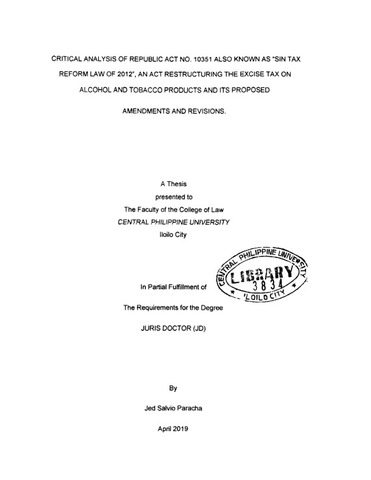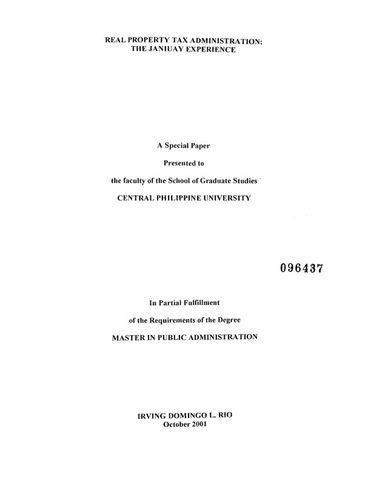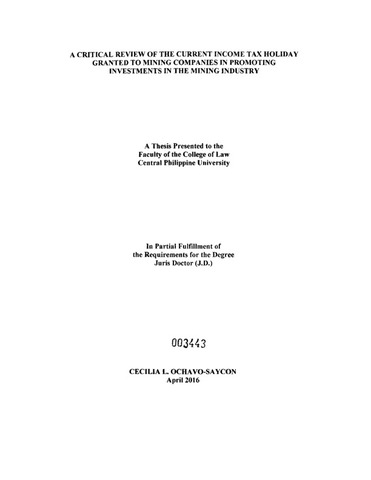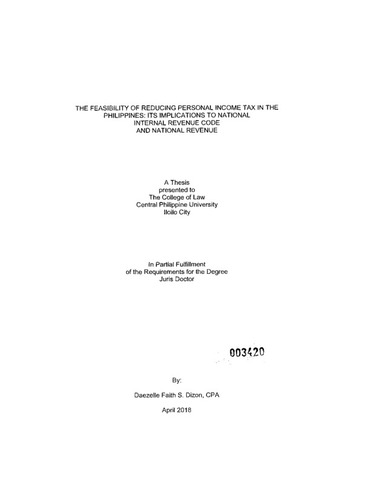Critical analysis of Republic Act No. 10351 also known as “Sin Tax Reform Law of 2012”, an act restructuring the excise tax on alcohol and tobacco products and its proposed amendments and revisions.
| dc.contributor.adviser | Alibogha, Salex E. | |
| dc.contributor.author | Paracha, Jed S. | |
| dc.date.accessioned | 2021-06-28T03:07:37Z | |
| dc.date.available | 2021-06-28T03:07:37Z | |
| dc.date.issued | 2019 | |
| dc.identifier.citation | Paracha, J. S. (2019). Critical analysis of Republic Act No. 10351 also known as “Sin Tax Reform Law of 2012”, an act restructuring the excise tax on alcohol and tobacco products and its proposed amendments and revisions. (Unpublished postgraduate thesis). Central Philippine University, Jaro, Iloilo City. | en_US |
| dc.identifier.uri | https://hdl.handle.net/20.500.12852/1105 | |
| dc.description | Abstract only | en_US |
| dc.description.abstract | According to The Global Adult Tobacco Survey (2009) twenty-eight percent (28%) or 17.3 million Filipino adults age 15 years and older are current tobacco smokers, according to the results of the 2009 Global Adult Tobacco Survey (GATS). It became the basis of our legislators that a law must be passed minimizing such number of tobacco users in the country without prejudicing the interest of our economy. This study was conducted to review the salient features of R.A. 10351 also known as the “Sin Tax Reform Law” of the Philippines. Basically this law was enacted with a two-fold purpose; one is to create revenue and the other is to minimize alcohol and tobacco consumption. Newspaper reports, surveys, and statistical data of the Bureau of Internal Revenue, Phil-Health, Department of Agriculture, Department of Finance, Bureau of Customs and the Department of Health were utilized to assess how the law was being implemented and if such implementation are according to its purposes. It was found out that the law created a minimal impact in minimizing the number of users of tobacco and alcohol and that the law is weak since there were loopholes that was not addressed. As shown in the reports of Department of Health the law was not properly implemented in view of the fact that the revenues collected were used to deceases not even related to alcohol and tobacco use. Also worth noting that because the law is weak excise taxes on tobacco and alcohol opened the door for smugglers to operate on a lesser cost of the products thus putting our economy in a prejudicial situation. | en_US |
| dc.format.extent | ix, 61 leaves | en_US |
| dc.language.iso | en | en_US |
| dc.rights | Attribution-NonCommercial-NoDerivs 3.0 Philippines | * |
| dc.rights.uri | http://creativecommons.org/licenses/by-nc-nd/3.0/ph/ | * |
| dc.subject.ddc | Law Library 340.72 P21 2019 | en_US |
| dc.subject.lcsh | Tobacco--Taxation | en_US |
| dc.subject.lcsh | Alcohol--Taxation | en_US |
| dc.subject.lcsh | Taxation | en_US |
| dc.subject.lcsh | Taxation--Law and legislation | en_US |
| dc.subject.lcsh | Alcohol | en_US |
| dc.subject.lcsh | Tobacco | en_US |
| dc.subject.lcsh | Cigarettes | en_US |
| dc.subject.lcsh | Cigarettes--Taxation | en_US |
| dc.title | Critical analysis of Republic Act No. 10351 also known as “Sin Tax Reform Law of 2012”, an act restructuring the excise tax on alcohol and tobacco products and its proposed amendments and revisions. | en_US |
| dc.type | Thesis | en_US |
| dc.description.bibliographicalreferences | Includes bibliographical references | en_US |
| dc.contributor.chair | Bedona, Zacarias D. Jr. | |
| dc.contributor.department | College of Law | en_US |
| dc.description.degree | Juris Doctor | en_US |
| local.subject | RA 10351 | en_US |
| local.subject | Sin Tax Reform Law of 2012 | en_US |
Files in this item
This item appears in the following Collection(s)
-
Juris Doctor [144]






